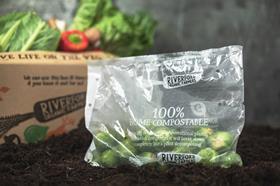
UK-based organic veg box company Riverford has completed a two-year journey to switch all of its fruit and vegetable packaging to home-compostable.
The move, a result of extensive research for the right material, will save 21 tonnes of plastic a year, the company revealed, on top of its switch to nets made from sustainable beechwood for netted produce.
The new materials involve an investment of around £300,000 a year, to be absorbed by the company. The aim is to find packaging that will break down in home compost heaps rather than requiring industrial temperatures, according to Riverford, as well as bypassing the UK’s 'ineffective and fragmented recycling system'.
The initiative is part of Riverford’s wider packaging pledge to remove, reduce and finally switch to home-compostable. Most Riverford produce already comes loose, while last year's launch of a Zero Packaging box served to emphasise this at point of sale.
Riverford founder Guy Singh-Watson commented: “For Riverford, compostable packaging is an improvement on single-use plastic because so many of our customers home-compost, and for those who don’t, we can collect [the packaging] along with the reusable box, compost with farm waste and return to the land to nourish future crops.'
“After many months of intensive research, we decided on the sustainable future of our packaging: 100 per cent home-compostable materials,” added sustainability manager Zac Goodall. “Once disposedof,this packaging will disintegrate into pieces smaller than 2mm within six months, and properly biodegrade (breaking down not into microplastics, but into carbon dioxide, water vapour and organic matter, just like a plant decomposing) within a year. It will break down like this even in low temperatures, such as your home compost heap.”
The new home-compostable bags are made from two materials: PEFC-certified wood pulp with non-GM European corn, and non-GM sugar cane with non-GM Europeancorn.To stabilise the materials andensure they preventfood waste, bothcontain some oil-based materials, which are compostable but prevent the bags from being classed as ‘plastic-free’. According to Riverford, this is why the switch is being communicated as home-compostable to customers.
'Punnets with a home-compostable topseal film are made by Canadian supply chain company CKF,' the company revealed, 'packaging firm TIPA is making open-top wicketed bags for hand-bagged products, while Coventry-based Parkside is making vertical flow-wrap home-compostable bags suitable for multi-head packing of produce such as baby leaf salad. The home-compostable nets are made with beechwood from Programme for the Endorsement of Forest Certification (PEFC)-certified forests by Austrian company Verpackungszentrum (VPZ). The wood is a natural by-product of forest thinning:a process which improves the health of the remaining trees. The nets are coloured using sustainable plant dyes.'
Always the realist, Singh Watson admitted that compostable 'plastic' was currently the 'least bad option'. It is four times as expensive as traditional packaging, he said, energy-intensive and risks contamination of recycling. 'But until our government accepts responsibility to unify local kerbside collection regimes and with less than 10 per cent of plastic bags being recycled, it is the least bad option,' he concluded.



